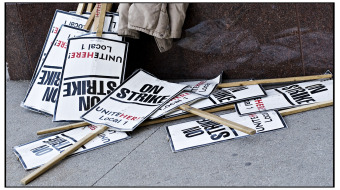Hotel Workers Negotiations With Hyatt Heat Up
By Kevin Robinson in News on Oct 27, 2009 2:20PM
The national debate over health care reform has dragged on for so long, across so many different proposals, that it's hard to keep track of what the Senate or the House might be considering this week. But here in Chicago, the very real cost associated with covering employees is manifesting itself in very direct ways. Unite Here Local 1, the union that represents hotel and hospitality workers in the city is in negotiations over the labor agreement that will cover 6,000 workers downtown, and 15,000 workers in the area. And while the contract expired in August, both the union and the hotels around town are still far from an agreement. Like they did three years ago, the union is negotiating with the major hotel chains separately this year, starting with Hyatt. Unlike in 2006, when Unite Here was able to make gains on the wage increases they bargained in 2003, employers are pushing for concessions this time, due in part to the recession. "Things have gotten really bad," Unite Here Local 1 spokeswoman Annemarie Strassel told the Tribune. "I think that employers see the bad economy as an opportunity to ram through proposals." Hyatt's proposal would leave half of their unionized employees ineligible for health insurance.
Reductions in health care coverage aren't unique to Chicago health care workers. Unite Here Local 2 members in San Fransisco voted recently to authorize a strike against Hyatt-owned hotels recently as well, as negotiations in the Western city have dragged on over similar issues. Overtime is another sticking point in negotiations. Hyatt cut almost 20 percent of its staff between November of last year and March of this year, while scheduling almost half of its staff for overtime between December and April of the same period. "If there's work to be done, why aren't we bringing people back to work?" Strassel said. "Of course, it's because the company wants to avoid paying health care benefits." The union argues that Hyatt can afford to bring more people back to work and cover their benefits. "The company has made record profits over the last decade," Strassel said. "Now that they're going public they're going to be flooded with cash and they're telling workers at the table it's a bad economy." Chicago's Pritzker family owns Hyatt, and is planning to take the company public with a 38 million share IPO, which is expected to raise some $900 million.
